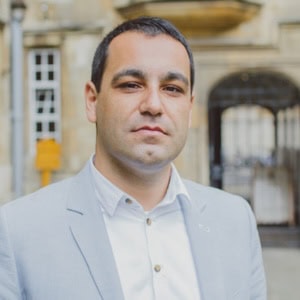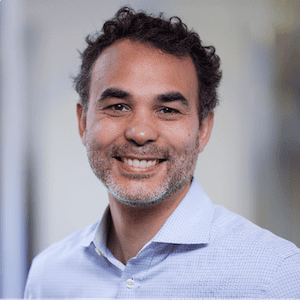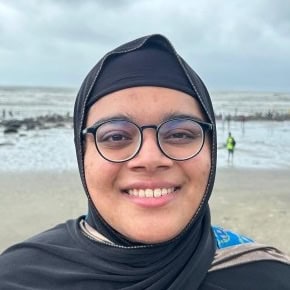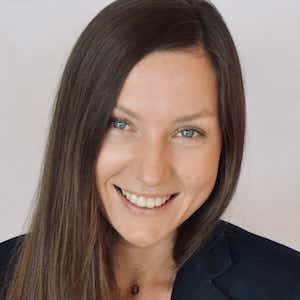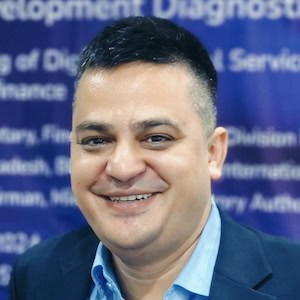-
The ‘Start Small, Stay Small’ Dilemma: How Nonprofit/Private Partnerships Can Boost Women-Owned Businesses
Women-owned businesses tend to start small and stay small, in part due to challenges accessing credit. They're also more likely to be discouraged from applying for financing for fear of being declined. Gina Harman, CEO of Accion's U.S. Network, and Andrea Jung, CEO of Grameen America, explain how their organizations are serving these entrepreneurs – and highlight some important ways this work can be expanded.
- Categories
- Uncategorized
-
Can Tech Humanize Microfinance? An Unexpected Benefit of Going Digital
Shuffling through papers while standing at a pho vendor’s street stall. Asking customers the same questions over and over again every loan cycle. CEP’s staff and clients constantly dealt with such frustrations until the Vietnam-based microfinance institution rolled out an app that digitized the loan and repayment process. Laura Cojocaru and Kelly Nguyen of BFA report on how the technology not only saves time, but helps loan officers connect on a more personal level with clients.
- Categories
- Finance
-
Here’s How to Play Matchmaker to Social + Business Metrics ‘Power Couples’
For many businesses and organizations, the idea of measuring their impact can be scary, elusive or just plain boring. But pairing social and business metrics "power couples" can give organizations unique insights to solve key business challenges. In a new report, the William Davidson Institute shares the results of its work with three organizations to demystify data collection of their social impacts. Rebecca Baylor of WDI writes that the team's work proves impact measurement doesn't have to be as hard as it may seem.
- Categories
- Impact Assessment, Social Enterprise
-
The Teacher-Researcher Divide: How Can Educators in Emerging Markets Make Better Use of Data?
Despite an explosion of high-quality research into K-12 learning outcomes in emerging markets, the data from those studies can be hard to interpret, leading educators to defer to their own experience and/or that of their peers instead. As a result, the best evidence on methods and strategies often goes unused by teachers. Sean Geraghty of the private school operator Bridge International Academies considers a recent partnership with the Liberian government and asks: How can educators truly incorporate the latest research into their lessons?
- Categories
- Education, Impact Assessment
-
Failure to Thrive: Nigeria’s Digital Financial Services Industry is Struggling – Can These Policy Solutions Help?
Nigeria leads all other emerging economies with 21 licensed mobile money operators. But high levels of unbanked and underbanked citizens have led to poor adoption rates for digital financial services. The Sustainable and Inclusive Digital Financial Services (SIDFS) initiative of the Lagos Business School has been studying ways to improve customer access and product development. In recently published research, Olayinka David-West and Ubukun Taiwo, both of LBS, reveal six policy recommendations for regulators that could help DFS to thrive in Nigeria.
- Categories
- Finance, Telecommunications
-
Better Neighborhood, Better Life: What Research Shows About Investments in Equitable Development
Research shows that a child's neighborhood impacts professional outcomes and earnings, and that environment plays a role in exacerbating racial inequality. That's why JPMorgan Chase is working with lenders across the U.S. on a new approach to community development – one focused on neighborhood revitalization. Colleen Briggs discusses Partnerships for Raising Opportunity in Neighborhoods, a $125 million, five-year capital commitment to help communities fuel economic growth.
- Categories
- Finance, Impact Assessment
-
Tackling Poverty Close to Home: Why Acumen is Boosting Financial Health in the U.S.
More than 40 million Americans live below the poverty line, and a majority live paycheck to paycheck. That's why, after nearly two decades and over $110 million of impact investments in Africa, Asia and Latin America, Acumen has expanded its focus to include the United States. Amon Anderson and Sarah Willis discuss how Acumen America, through its financial inclusion portfolio supported by MetLife Foundation, aims to build a future where low-income Americans enjoy stability, protection and prosperity.
- Categories
- Finance, Investing, Social Enterprise, Technology
-
We’re Undervaluing Value Addition: How Ag Processing Will Fortify Food Security, Incomes and Development
The world's cocoa farmers get only 3 percent of the value of a chocolate bar, and Africa, home to 60 percent of the world’s arable land, is a net importer of food that could be processed at lower cost on the continent. The problem is that agriculture producers in emerging markets grow the crops only to watch as others grab the profits. The solution, says Donna Rosa, is to improve the solid food processing industries in developing countries.
- Categories
- Agriculture, Social Enterprise
